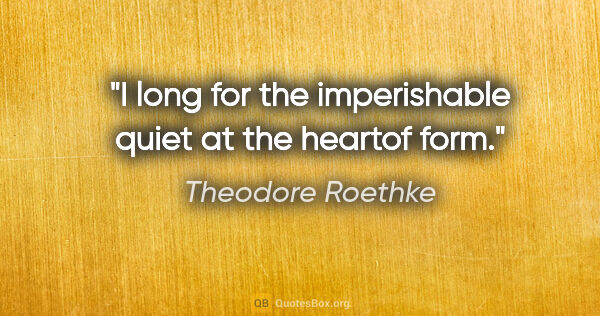Form Quotes (page 35)
In times when history still moved slowly, events were few and far between and easily committed to memory. They formed a commonly accepted backdrop for thrilling scenes of adventure in private life. Nowadays, history moves at a brisk clip. A historical event, though soon forgotten, sparkles the morning after with the dew of novelty. No longer a backdrop, it is now the adventure itself, an adventure enacted before the backdrop of the commonly accepted banality of private life.
Milan Kundera

When I saw any external object, my consciousness that I was seeing it would remain between me and it, enclosing it in a slender, incorporeal outline which prevented me from ever coming directly in contact with the material form; for it would volatilise itself in some way before I could touch it, just as an incandescent body which is moved towards something wet never actually touches moisture, since it is always preceded, itself, by a zone of evaporation.
Marcel Proust
A symbolic unity formed by the languor of the fluids, by the darkening of the animal spirits and the shadowy twilight they spread over the images of things, by the viscosity of the blood that laboriously trickles through the vessels, by the thickening of vapors that have become blackish, deleterious, and acrid, by visceral functions that have become slow and somehow slimy-this unity, more a product of sensibility than of thought or theory, gives melancholia its characteristic stamp.
Michel Foucault
Wherever snow falls, or water flows, or birds fly, wherever day and night meet in twilight, wherever the blue heaven is hung by clouds, or sown with stars, wherever are forms with transparent boundaries, wherever are outlets into celestial space, wherever is danger, and awe, and love, there is Beauty, plenteous as rain, shed for thee, and though thou shouldest walk the world over, thou shalt not be able to find a condition inopportune or ignoble.
Ralph Waldo Emerson
It came over him now that the unexpected favours of fortune, no matter how dazzling, do not mean very much to us. They may excite or divert us for a time, but when we look back, the only things we cherish are those which in some way met our original want; the desire which formed in us in early youth, undirected, and of its own accord.
Willa Cather
Since the mass of the employed living labour is continually on the decline as compared to the mass of materialised labour set in motion by it, i. e., to the productively consumed means of production, it follows that the portion of living labour, unpaid and congealed in surplus-value, must also be continually on the decrease compared to the amount of value represented by the invested total capital. Since the ratio of the mass of surplus-value to the value of the invested total capital forms...
Karl Marx


